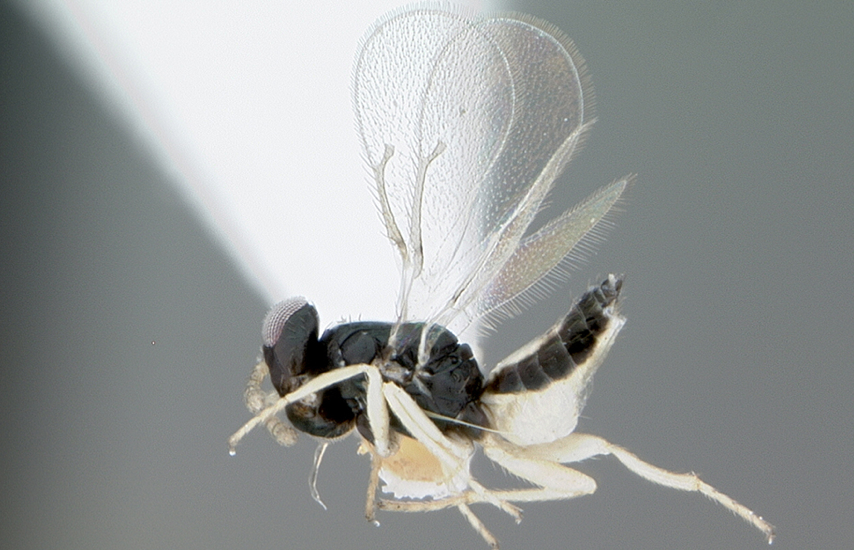LOS ÁNGELES — Miles de pequeñas avispas parasitarias fueron liberadas esta semana en el Sur de California, pero las autoridades dicen que son insectos beneficiosos que reducirán las cantidades de una peste que esparce una enfermedad que está matando los árboles cítricos de la región.
La pequeña avispa, tamarixia radiata, no tiene aguijón y tiene el tamaño del punto al final de una oración. Están siendo liberadas esta semana en los vecindarios de los condados de Los Ángeles, Orange, Riverside y Ventura para reducir las poblaciones del psílido asiático de los cítricos, la peste que transmite la enfermedad Huanglongbing, según el Departamento de Alimentos y Agricultura del estado.
Se han encontrado más de 2.000 árboles cítricos residenciales con Huanglongbing, también conocida como HLB, en ciudades del norte del condado de Orange, Long Beach, en el este del condado de Los Ángeles y en Riverside, según la División de Agricultura y Recursos Naturales de UC Riverside. La enfermedad no ha sido detectada en el condado de Ventura, pero se han encontrado allí varios psílidos asiáticos de los cítricos, o ACP.
Las autoridades dicen que las avispas, que son un depredador natural del ACP, se liberaron de forma periódica esta semana. Se instó a los propietarios de árboles cítricos a que colocaran veneno para hormigas alrededor de estos árboles para reducir la cantidad de hormigas, ya que pueden interferir con insectos beneficiosos como la tamaraxia y proteger a pestes dañinas como el ACP.
Para obtener más información visita: https://californiacitrusthreat.org/spanish/
***
BENEFICIAL WASPS RELEASED IN LOS ANGELES, ORANGE, RIVERSIDE AND VENTURA COUNTIES TO HELP FIGHT DEADLY CITRUS TREE DISEASE
California Department of Food and Agriculture is Releasing Thousands of Insects This Week
To help prevent the spread of the deadly citrus tree disease, Huanglongbing (HLB) threatening California’s beloved citrus, thousands of tiny insects called Tamarixia radiata are being released in Los Angeles, Orange, Riverside and Ventura County neighborhoods to reduce populations of the Asian citrus psyllid (ACP) – the pest that carries the disease.
Tamarixia radiata is a tiny, parasitic wasp and a form of natural biological control used to protect citrus orchards and homegrown citrus trees by reducing populations of ACP. Psyllids can carry HLB and spread the disease from tree to tree as they feed. The best way to stop the spread of HLB is to prevent the spread of the ACP. HLB has been confirmed in more than 2,000 residential citrus trees across Los Angeles, Orange, San Bernardino and Riverside counties. While the disease has not been detected in Ventura County, several ACP have been collected by the California Department of Food and Agriculture (CDFA) in Ventura County.
Releases of Tamarixia radiata will be conducted periodically in Los Angeles, Orange, Riverside and Ventura County neighborhoods throughout September – October.
Additional details on Tamarixia radiata can be found at: https://californiacitrusthreat.org/protect-your-citrus/ – biological-control. A map of ACP detections, HLB detections and Tamarixia radiata releases can be found here: https://ucanr.edu/sites/ACP/Distribution_of_ACP_in_California/.

